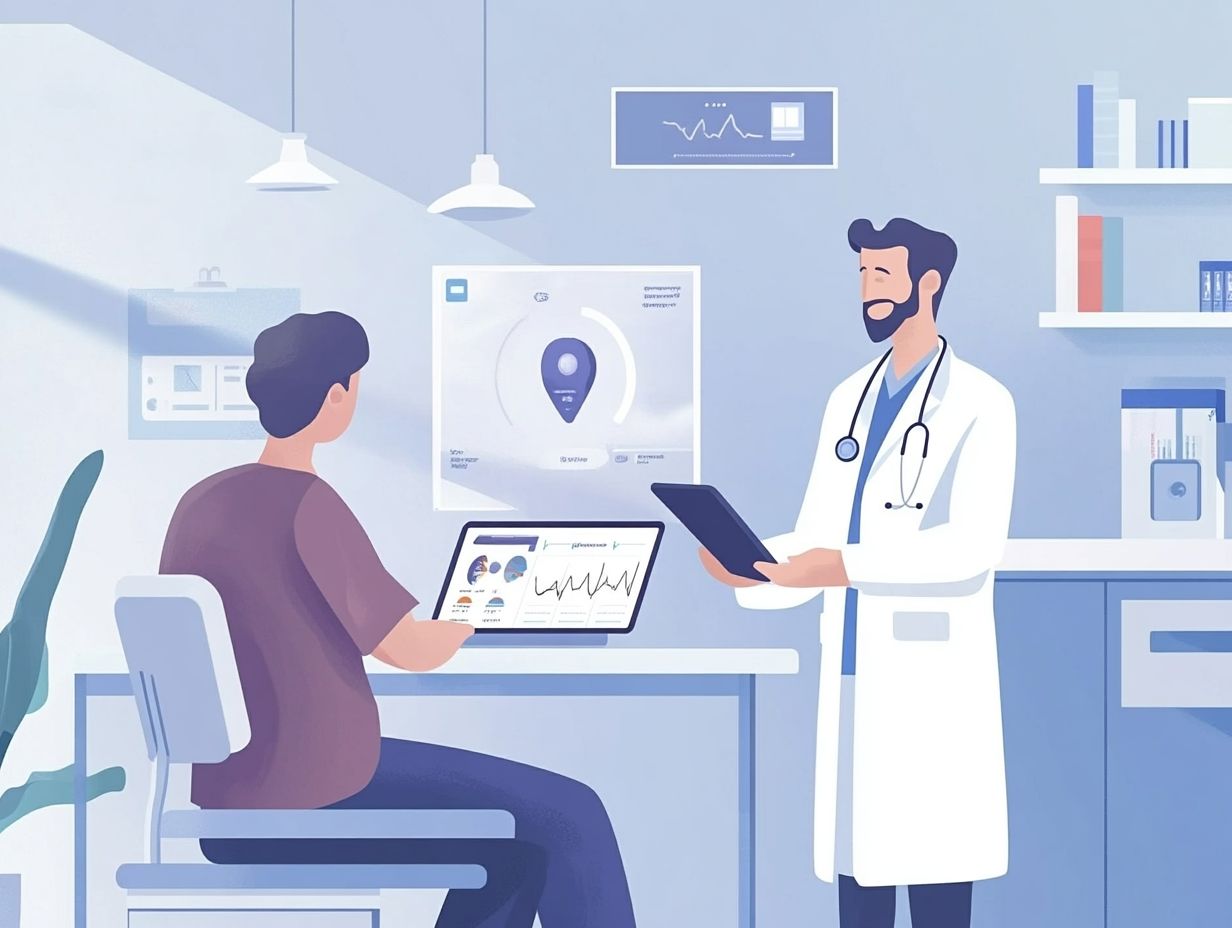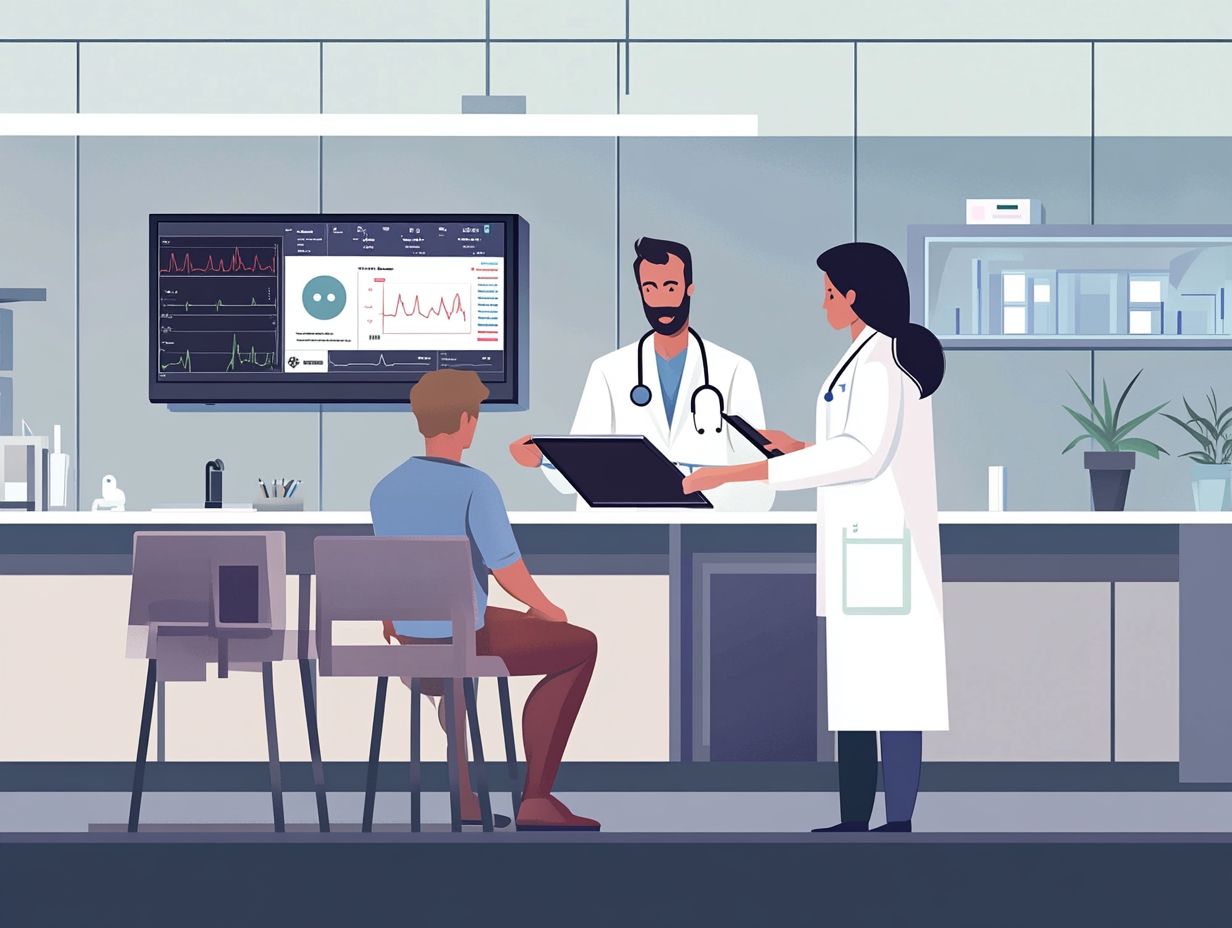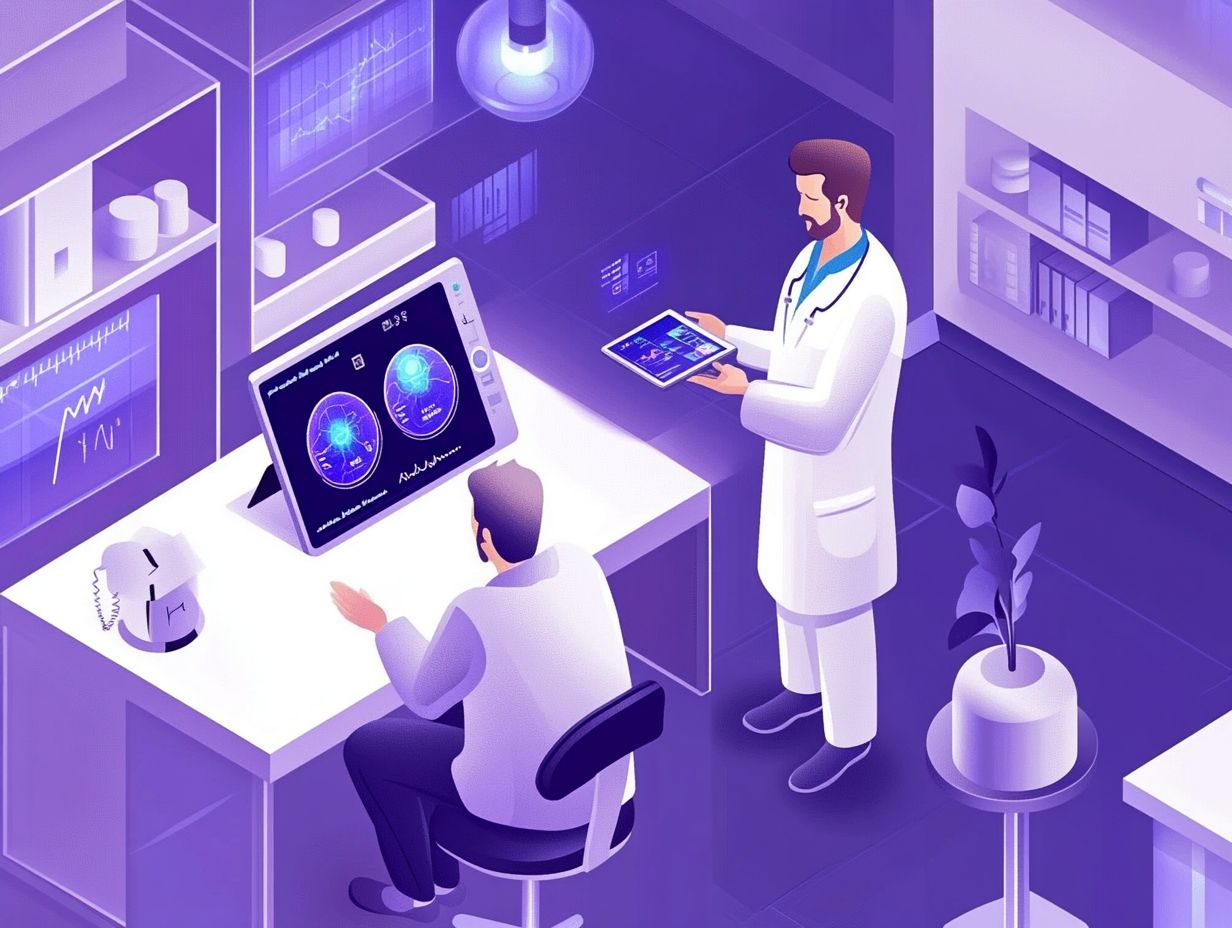The Impact of AI on Healthcare
Artificial Intelligence (AI) is transforming the healthcare landscape. It brings forth innovative solutions that enhance diagnosis, treatment, and overall patient care. However, it also addresses complex challenges and ethical implications.
By simplifying medical imaging and accelerating drug discovery, AI boosts efficiency. It lays the groundwork for personalized medicine tailored to individual needs, revolutionizing healthcare delivery.
However, with these advancements arise significant concerns about data privacy, potential biases, and the implications for future healthcare employment and job satisfaction within the healthcare workforce.
This article delves into how AI is being harnessed in healthcare. It examines its benefits alongside the challenges it presents and explores ways to ensure its responsible implementation, including considerations for data analytics and health informatics.
Prepare to discover the profound impact AI is having on the medical field.
Contents
- 1 Key Takeaways:
- 2 How is AI Used in Healthcare?
- 3 What are the Benefits of AI in Healthcare?
- 4 What are the Concerns about AI in Healthcare?
- 5 Impact on Healthcare Jobs
- 6 How Can AI be Used Responsibly in Healthcare?
- 7 Transparency and Explainability
- 8 Ethical Considerations
- 9 Collaboration between AI and Healthcare Professionals
- 10 Frequently Asked Questions
- 10.1 What is the impact of artificial intelligence on healthcare?
- 10.2 How does AI improve patient outcomes in healthcare?
- 10.3 What are the potential benefits of using AI in healthcare?
- 10.4 Are there any concerns about the impact of AI on healthcare?
- 10.5 How can AI be used in healthcare for early detection of diseases, including complex conditions like COVID-19?
- 10.6 What role will human doctors play in a healthcare system that utilizes AI?
Key Takeaways:

- AI is revolutionizing healthcare by improving efficiency and accuracy, enabling faster diagnoses, and providing personalized treatment plans.
- Concerns about AI in healthcare include data privacy and security, lack of regulation, potential for bias, ethical implications, and impact on healthcare jobs.
- To ensure responsible use of AI in healthcare, transparency and explainability, ethical considerations, patient engagement, and collaboration between AI and healthcare professionals are crucial.
How is AI Used in Healthcare?
Artificial Intelligence (AI) is revolutionizing the healthcare sector. It enhances clinical workflows, improves patient outcomes, and simplifies administrative tasks.
With the integration of machine learning and natural language processing, AI tools enable healthcare professionals to diagnose conditions, predict treatment options, and manage patient data with remarkable efficiency, ultimately transforming healthcare delivery.
From telemedicine applications that facilitate remote consultations to advanced medical imaging technologies that enable precise diagnostics, AI’s role is becoming increasingly pivotal in driving innovation within health systems.
Furthermore, the application of AI in genomics is paving the way for precision medicine. This ensures that treatment strategies are expertly tailored to meet individual patient needs, enhancing overall healthcare delivery.
1. Diagnosis and Treatment
AI is revolutionizing the healthcare industry by significantly enhancing diagnosis and treatment. It equips healthcare professionals with advanced clinical decision support systems that can analyze extensive amounts of patient data.
These systems use machine learning to find patterns in large amounts of patient data. For instance, tools like IBM Watson Health can assist oncologists in diagnosing cancers by sifting through medical literature, clinical trial data, and patient histories.
They suggest personalized treatment pathways tailored specifically to each individual case, ensuring greater precision in patient care.
In a similar vein, AI algorithms are making impressive strides in radiology. Platforms like Zebra Medical Vision employ deep learning to interpret medical images, leading to significantly improved detection rates for various conditions.
These groundbreaking innovations not only simplify the diagnostic process but also enhance patient outcomes by facilitating timely and accurate interventions. Ultimately, they transform the landscape of modern healthcare and medical research.
2. Medical Imaging
In the realm of medical imaging, AI technologies are transforming how you interpret scans and images. This transformation significantly boosts both diagnostic accuracy and efficiency.
These sophisticated systems utilize machine learning algorithms to sift through vast amounts of imaging data, pinpointing patterns and anomalies that might escape the human eye. By supporting radiologists in their evaluations, AI not only elevates their productivity but also ensures a greater level of precision in diagnoses.
The integration of AI into medical imaging is crucial in the rapidly evolving field of precision medicine, providing tailored diagnostic insights that consider individual patient characteristics. This powerful capability enables you to develop more personalized treatment plans, ultimately leading to enhanced patient outcomes and a more efficient healthcare system.
3. Drug Discovery and Development
AI is becoming increasingly crucial in the drug discovery and development process, allowing you to identify potential compounds faster and more efficiently while ensuring patient safety during clinical trials and improving overall healthcare delivery.
This transformative technology makes use of large amounts of data to predict drug interactions through advanced analytics. This effectively minimizes the risks associated with new treatments.
It also optimizes the design of clinical trials by analyzing patient data to identify suitable candidates, streamlining recruitment, and tailoring effective treatment protocols, reducing healthcare costs.
Take, for instance, AI-driven projects like Atomwise, which have shown impressive success in pinpointing promising compounds for diseases such as Ebola and multiple sclerosis. These innovations significantly reduce the time and resources typically needed in traditional drug discovery processes.
Additionally, AI algorithms can monitor adverse effects post-approval, enhancing overall patient safety and efficacy.
4. Personalized Medicine
The rise of AI in personalized medicine presents you with remarkable opportunities to customize treatment strategies that align perfectly with your unique genetic profile and health data, fostering greater patient engagement.
By using advanced tools to analyze genomic information, healthcare providers can identify specific genetic markers that indicate how you respond to treatments. This helps in selecting not only more effective medications but also engages you in your health journey. Additionally, it aids in quality reporting and improving overall wellness.
When you’re involved in this process, treatment plans become more than just clinically sound; they align seamlessly with your preferences and lifestyle. Embracing personalized medicine enhances healthcare delivery by minimizing adverse effects, boosting treatment efficacy, enhancing patient engagement, and ultimately elevating your satisfaction and outcomes.
What are the Benefits of AI in Healthcare?

The integration of AI into healthcare systems offers a wealth of benefits that elevate efficiency, accuracy, and, ultimately, the quality of patient care, while also addressing critical aspects of data management and technology integration.
By automating administrative tasks and enhancing clinical decision-making, AI technologies enable substantial cost savings for healthcare organizations while simultaneously boosting job satisfaction among healthcare professionals and improving patient outcomes.
With the support of predictive analytics and robust data management, you can optimize processes and resources within hospitals and health systems, paving the way for improved treatment options and outcomes for patients, enhancing overall healthcare delivery.
1. Improved Efficiency and Accuracy
AI dramatically enhances both efficiency and accuracy in healthcare by automating routine tasks. This allows you, as a healthcare professional, to concentrate more on what truly matters: patient care and the field of health informatics.
For example, by implementing AI-driven chatbots, you can streamline appointment scheduling and address patient inquiries. This significantly reduces your administrative workload.
AI algorithms are also at work analyzing patient data, uncovering patterns that boost diagnostic precision. This improvement enhances patient engagement and overall care.
Take tools like IBM Watson Health, for instance. They’ve proven effective in leveraging machine learning to help oncologists craft personalized cancer treatment plans, thereby minimizing the chances of human error.
In a similar vein, AI-powered imaging analysis is transforming radiology. It delivers more accurate assessments of medical images, leading to faster and more reliable diagnoses.
By integrating these advanced technologies, you can enhance operational efficiency within your practice. This, in turn, elevates the overall quality of patient care you provide, leading to better patient outcomes and satisfaction.
2. Faster and More Precise Diagnoses
With the power of AI at your fingertips, you can achieve faster and more precise diagnoses. This ultimately improves patient outcomes and elevates the quality of care you provide.
This remarkable technology leverages vast amounts of data, enabling advanced data analysis that can uncover patterns and anomalies often missed by human practitioners.
By integrating clinical decision support systems infused with AI, you become better equipped to make informed choices. This significantly reduces the likelihood of diagnostic errors and addresses critical health informatics needs.
Take, for example, a compelling case study from an emergency department where AI algorithms were applied to radiology images. The results were striking—detection rates for critical conditions like pulmonary embolism soared.
Consequently, patient recovery times shortened dramatically, underscoring the transformative potential of AI-driven diagnostics in revolutionizing traditional healthcare practices and improving patient safety.
3. Personalized Treatment Plans
AI enables you to develop personalized treatment plans that cater specifically to your unique needs, especially in the realm of genomics. This ensures better patient outcomes.
By sifting through vast amounts of genomic data along with your individual information, artificial intelligence can uncover patterns and insights that might have previously slipped through the cracks.
This opens the door to more effective treatment strategies, allowing healthcare providers to move beyond the outdated one-size-fits-all approach.
For instance, initiatives like the Genomic Data Commons illustrate how AI can fine-tune cancer therapies based on the specific genetic composition of tumors. This leads to enhanced treatment responses and minimized side effects for you.
In a similar vein, leveraging AI in pharmacogenomics—the study of how genes affect a person’s response to drugs—helps determine the most appropriate medications tailored for you. This optimizes effectiveness while reducing the risk of adverse reactions.
Such advancements highlight the transformative potential of personalized medicine in not only improving health outcomes but also enriching your overall patient experience.
4. Cost Savings
By automating routine administrative tasks and optimizing healthcare processes, you can achieve significant cost savings for your organization. This technology streamlines operations, allowing your staff to devote more time to patient care instead of getting bogged down by paperwork.
For example, a recent study by McKinsey revealed that AI can help reduce operational costs by as much as 30%. This can translate into millions of dollars in savings for healthcare facilities.
Hospitals that embrace AI for resource management have reported a remarkable 20% reduction in supply chain expenses.
Implementing predictive analytics enables your healthcare system to manage staffing more effectively. This leads to fewer instances of overstaffing and a more strategic allocation of resources.
Overall, these advancements not only enhance the financial health of your organization but also lead to improved patient outcomes. This makes a compelling case for the broader adoption of AI.
What are the Concerns about AI in Healthcare?
While the advantages of AI in healthcare are plentiful, several pressing concerns warrant your attention. These include data privacy, inadequate regulation, potential biases, and the implications for employment within the healthcare sector.
As healthcare organizations embrace AI technologies, it’s imperative for you to consider the ethical ramifications related to data management and patient privacy, by striving for accurate and impartial outcomes.
Additionally, the automation of specific tasks can stir unease about job displacement among healthcare professionals, highlighting the need for a thoughtful and balanced approach to integrating technology into this vital field.
1. Data Privacy and Security

Data privacy and security stand as paramount concerns in your integration of AI within healthcare, especially since sensitive patient information must be shielded from unauthorized access and breaches.
This importance only grows as you increasingly rely on AI systems to analyze vast amounts of patient data for diagnostics, treatment plans, and personalized care strategies.
You should implement best practices to maintain data security. Consider the following suggestions:
- Regularly train your employees to ensure they are aware of potential threats and protocols.
- Establish robust access controls to limit data exposure.
- Utilize encryption methods to protect data during transmission, making it far more difficult for unauthorized individuals to intercept sensitive information.
Additionally, continuous monitoring and risk assessments can help you identify potential vulnerabilities, fostering a culture of privacy and trust within your healthcare environment.
2. Lack of Regulation
The absence of comprehensive regulation surrounding AI in healthcare presents significant ethical implications and challenges for organizations like yours as you navigate the implementation of these transformative technologies.
As your organization increasingly depends on AI for diagnostics, treatment recommendations, and patient management, the need for a clear regulatory framework becomes more critical than ever.
Without these guidelines, the risks associated with bias in algorithms, privacy breaches, and patient safety concerns may not only persist but could also escalate into more serious issues.
A robust regulatory structure should include teams of experts from different fields who can thoroughly evaluate AI systems, along with mandates for transparency in AI decision-making processes.
Continuous monitoring and adaptation of these regulations will be essential to keep pace with the rapid evolution of AI technologies, ensuring they are utilized safely and ethically within your healthcare setting.
3. Potential for Bias
AI systems hold immense potential in healthcare, but they can also introduce bias if not meticulously designed and monitored. This bias can have a detrimental impact on patient outcomes.
Often, this bias arises from the data used to train the algorithms, which may mirror existing inequalities or fail to represent diverse populations adequately.
For example, if the training data is dominated by information from a specific demographic, the AI may struggle to perform effectively for underrepresented groups, resulting in disparities in diagnosis and treatment.
To avert such outcomes, it is crucial for you to prioritize diversity in data sets, ensuring they reflect a broad spectrum of demographics and health conditions.
By implementing continuous monitoring of AI systems, you can identify and address biases as they emerge, paving the way for a more equitable healthcare delivery landscape.
Impact on Healthcare Jobs
The rise of AI and automation in healthcare prompts consideration of the potential impact on healthcare jobs, raising valid concerns about job displacement and shifts in workforce roles.
As these technologies become more woven into the fabric of daily operations, healthcare professionals may find themselves navigating a challenging situation. On one hand, some positions could be at risk of elimination. On the other, there’s a growing demand for new roles that prioritize advanced skills in data analysis, which means examining and interpreting data to make informed decisions, AI operation, and patient interaction.
This evolving environment calls for robust training programs designed to equip healthcare professionals with essential tools to not only survive but thrive. While the transition may enhance patient care and operational efficiency, it will require a significant investment in education and upskilling to ensure readiness to navigate these changes with confidence.
How Can AI be Used Responsibly in Healthcare?
To truly harness the full potential of AI in healthcare, healthcare professionals should approach these technologies with a sense of responsibility. This means prioritizing transparency, addressing ethical considerations, and fostering a collaborative environment between AI systems and healthcare professionals.
Embracing this mindset will not only enhance the efficacy of AI but also ensure that it aligns with the core values of patient care.
Transparency and Explainability
Transparency and explainability are essential for the responsible integration of AI in healthcare, ensuring that healthcare professionals fully grasp how AI systems derive their recommendations.
This understanding is crucial not only for the accuracy of diagnoses and treatments but also for fostering trust between healthcare professionals and their patients. When healthcare professionals can decipher the logic and data behind AI-driven decisions, they’re in a much stronger position to share these insights with patients, creating a collaborative care environment.
Several initiatives, like the FDA’s digital health guidance and partnerships between tech companies and academic institutions, are designed to enhance the explainability of AI systems. By establishing standardized frameworks and models that clearly articulate how algorithms operate, these efforts seek to mitigate concerns related to accountability and bias, paving the way for a more trustworthy healthcare landscape.
Ethical Considerations

When implementing AI in healthcare, ethical considerations must be placed at the forefront, particularly regarding data privacy, informed consent, and the potential effects on patient outcomes.
As healthcare organizations increasingly rely on AI technologies to enhance diagnostics, treatment plans, and operational efficiency, navigating the complex ethical landscapes becomes essential. The right to privacy is paramount, especially since sensitive health information is often utilized by AI systems to function effectively. Obtaining genuine informed consent is critical; patients should fully understand how their data will be used and the implications of AI decisions on their health.
Organizations have the responsibility to ensure that these standards are not only upheld but also regularly assessed and improved. This commitment fosters trust and transparency as AI continues to integrate into the medical field, enhancing healthcare delivery and driving innovations in digital health.
Collaboration between AI and Healthcare Professionals
Effective collaboration between AI technologies and healthcare professionals is vital for elevating patient care, improving patient outcomes, and streamlining clinical workflows. Working together with AI can make healthcare jobs more satisfying.
This cooperation can result in enhanced diagnostic accuracy, tailored treatment plans, and more efficient administrative tasks. For example, AI can analyze large amounts of patient data. This helps identify trends that inform clinical decisions.
Successful collaborations abound, such as those where AI-assisted imaging (a technology that helps interpret images) and natural language processing (which helps computers understand human language) have significantly reduced the time needed for radiology readings and clinical decision support. This allows for faster diagnoses and better patient engagement.
To cultivate a collaborative culture, consider implementing strategies like regular training sessions and comprehensive training programs to familiarize your healthcare staff with these technologies. Encouraging feedback and fostering open communication between clinicians and AI developers will ensure that the integration of AI into health systems is seamless and truly impactful.
Additionally, addressing ethical implications and ensuring robust data management and health informatics practices are crucial.
Frequently Asked Questions
Here are some frequently asked questions about AI in healthcare.
What is the impact of artificial intelligence on healthcare?
The impact of artificial intelligence on healthcare is significant and far-reaching. It has the potential to transform the way medical professionals diagnose and treat diseases, improve patient outcomes, and increase efficiency in healthcare delivery while also addressing complex challenges.
How does AI improve patient outcomes in healthcare?
AI has the ability to analyze large amounts of patient data and identify patterns and trends that may not be easily visible to human doctors. This enables more accurate diagnoses, personalized treatment plans, and better overall patient outcomes, contributing to the advancement of tailored treatments.
What are the potential benefits of using AI in healthcare?
Some potential benefits of using AI in healthcare include improved accuracy and efficiency in diagnosis, increased accessibility to healthcare in remote areas, better management of patient data and health data, and cost savings for both patients and healthcare providers.
Are there any concerns about the impact of AI on healthcare?
Yes, there are concerns about the ethical implications of using AI in healthcare, including data privacy, bias in algorithms, and the potential for job displacement for healthcare professionals. It is important to address these concerns as AI continues to be integrated into healthcare systems, ensuring a balanced approach towards technology adoption and workforce sustainability.
How can AI be used in healthcare for early detection of diseases, including complex conditions like COVID-19?
AI can analyze large amounts of medical data, such as patient records, imaging scans, and genetic information, to identify patterns and markers that may indicate the early stages of a disease. This enables early detection and treatment, potentially improving patient outcomes and facilitating advancements in genomics and tailored treatments.
What role will human doctors play in a healthcare system that utilizes AI?
While AI has the potential to greatly improve healthcare, human doctors will still play a crucial role in decision-making and providing personalized care to patients. AI can assist doctors in making more accurate diagnoses and treatment strategies, but ultimately, the human touch and empathy in healthcare cannot be replaced by machines.
Furthermore, clinicians will need to oversee clinical trials and ensure patient safety throughout the process.